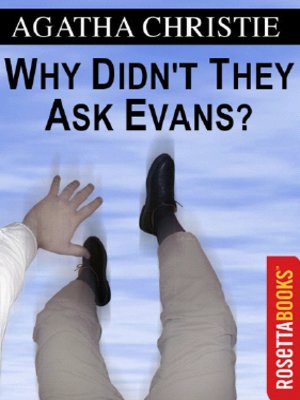
Sign up to save your library
With an OverDrive account, you can save your favorite libraries for at-a-glance information about availability. Find out more about OverDrive accounts.
Find this title in Libby, the library reading app by OverDrive.



Search for a digital library with this title
Title found at these libraries:
| Library Name | Distance |
|---|---|
| Loading... |
While playing golf one day, Bobby hears a yell and then finds that a man has fallen off a mist-shrouded cliff at the seventeenth hole and broken his back. Bobby hears the dying man's words, "Why didn't they ask Evans?" and stays with him until help arrives. The mysterious phrase means nothing to Bobby and what's more, he is an incurious sort of chap. So after the inquest, he returns to his daily preoccupations, and thinks little about the death of the mysterious stranger. Whoever pushed the unfortunate man off of the cliff, however, is wracked with suspicion and doubt (as murderers often are), and believes Bobby is much more of a threat than he really is. One way or another, Bobby must be silenced.
This is just one of the many touches that make it easy to see why Agatha Christie is the most popular novelist of all time. Her works have sold over 2 billion copies worldwide, a figure surpassed only by the Bible and Shakespeare. Christie takes her reader seriously: she creates complex, intelligent plots and features characters whose behavior rarely forces us to suspend our disbelief. Bobby's cheerful obliviousness and the killer's obsessive paranoia are not only plausible, even natural, responses, they set up one of the novel's terrific ironies: the killer has gotten away with the murder, but his or her fear and vigilance actually draw Bobby into the mystery and onto the trail.
In the early going, leisure and privilege also work in the killer's favor, as Bobby's affable indifference to the man's death seems a function of his sleepy, somewhat indulgent lifestyle. Yet when an attempt is made on his life, and he is roused from his pastoral indolence, Bobby has more than enough time and more than enough resources to poke around for clues and leads. He is aided by the Lady Frances Derwent, an Earl's daughter who finds the intrigue a welcome break from the tedium of high class social affairs and proves herself more cunning and daring than Bobby himself. Part of what makes the Lady Frances so intrepid, one senses, is that her life of privilege keeps her from ever believing that something bad could happen to a Derwent. The mystery is a game and a lark, a feeling that persists even after both she and Bobby realize that it is anything but.
In painting her portraits of Bobby and Frankie Derwent, Christie manages to balance a breezy good-natured satire of the British upper class with the tension that a good mystery novel ultimately depends upon. The novel is funny and charming. It doesn't take itself too seriously, but it manages to provide us with the required suspense and devious plot twists. As always with Christie, the reader is beset by false clues, deceptive characters, dead ends, unknown motives and, in this case, an enigmatic phrase that arises again and again: Why didn't they ask Evans?







